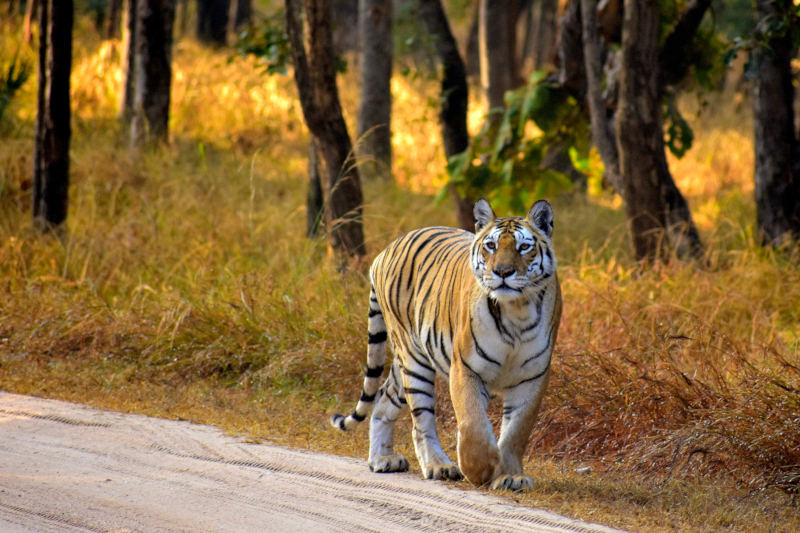Pench National Park, located in the third largest Indian state, Maharashtra, perches on the border between the states of Madhya Pradesh and Maharashtra. Renowned for its rich biodiversity and scenic landscapes, the park spans over 750 square kilometres and serves as a critical habitat for a diverse array of flora and fauna. The park derives its name from the meandering Pench River, which flows through its expanse, creating a lifeline for the region's wildlife. Notably, Pench National Park is famous for being the inspiration behind Rudyard Kipling's classic tale, "The Jungle Book," and visitors may find themselves immersed in a setting reminiscent of Mowgli's adventures.
Pench National Park is characterized by its conducive environment for the thriving populations of tigers, leopards, deer, and numerous bird species. The park is a designated tiger reserve and is part of the extensive Pench Tiger Reserve, contributing to the conservation efforts for this endangered species. Beyond its significance for wildlife conservation, Pench National Park also offers a unique experience for eco-tourists, with opportunities for safaris and nature walks, allowing visitors to witness the enchanting beauty of the natural world while contributing to the preservation of this vital ecosystem.
The success of ecotourism in Pench is intricately linked with the involvement of local communities. Residents are actively engaged in various aspects of tourism, from guiding to hospitality services. This not only provides them with economic opportunities but also fosters a sense of responsibility towards the preservation of their natural heritage.
In the vicinity of Pench National Park, the vibrant tapestry of tribal communities adds a unique dimension to the region's cultural and ecological landscape. These indigenous groups, deeply rooted in their traditions, coexist harmoniously with the wilderness, contributing to the rich diversity of the area.
The Gond Tribe:
The Gond tribe is one of the prominent indigenous communities in the Pench region. Known for their distinct art and vibrant culture, the Gonds strongly connect to the land. Many Gond individuals engage in traditional practices such as farming, and their intimate knowledge of the local flora and fauna is invaluable for both conservation efforts and ecotourism.
With their significant presence in the region, they have a profound understanding of the forest ecosystem. They often rely on sustainable harvesting practices and possess a deep knowledge of medicinal plants. The Gonds’ traditional lifestyle is closely entwined with nature, making them essential partners in preserving the ecological balance of Pench.
These tribal communities are integral to the conservation initiatives around Pench National Park. Many poachers-turned-conservationists engage in activities such as patrolling against poaching, participating in reforestation projects, and promoting sustainable resource use. Their traditional wisdom and practices contribute significantly to the overall well-being of the ecosystem.
The tribal communities in the Pench region have a rich cultural heritage, expressed through traditional music, dance, and art. Visitors have the opportunity to immerse themselves in this cultural tapestry, gaining insights into age-old customs and rituals, especially their Baiga dance performance. This cultural exchange fosters a deeper appreciation for the symbiotic relationship between the tribes and their natural surroundings.
While some tribal members continue traditional occupations like farming and gathering forest resources, others have embraced eco-friendly livelihood practices. A growing number of individuals from these communities are involved in ecotourism, working as guides, artisans, or in hospitality, thus directly benefiting from and contributing to the sustainable tourism around Pench National Park. While planning for a Jungle Safari Booking for Pench do not miss on an acquainting opportunity with the tribal groups to enlighten yourself.
These tribal communities in the vicinity of the Pench National Park are like the guardians of the national park, carrying forward their legacy of actively participating in the conservation of the natural-based blessings that surround them.

